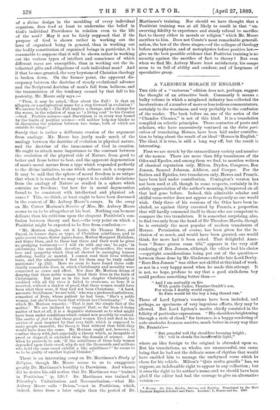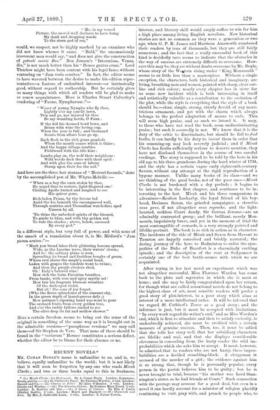A VARIORUM HORACE IN ENGLISH.* THE title of a "
variorum" edition does not, perhaps, suggest the thought of an attractive book. Commonly it means a bulky volume in which a misplaced industry has collected the lucubrations of a number of more or less tedious commentators, certainly to the weariness, and very probably to the confusion of the reader. The book before us, one of the series of the " Chandos Classics," is not of this kind. It is a translation compiled on eclectic principles. Three centuries of poets and scholars, who have successively ventured on the dulce peri- culum of translating Horace, have been laid under contribu- tion to bring about the result of an ideal "Horace in English."
The ideal, it is true, is still a long way off, but the result is interesting.
First we are struck by the extraordinary variety and number of the names. There are more than fifty translators of the Odes and Epodes, and among them we find, to mention writers of classical reputation only, Milton, Dryden, Congreve, Ben Jonson, Samuel Johnson, Addison, and Cowper. For the Satires and Epistles, two translators only, Howes and Francis, have been laid under contribution. Conington's version has not been used at all, though in some respects, certainly in its subtle appreciation of the author's meaning, it improved on all that had gone before. Indeed, this admirable scholar and skilful verse-writer does not appear as frequently as one would wish. Only three of his versions of the Odes have been in- cluded, as against thirty executed by Francis, a proportion that will hardly commend itself to those who are competent to compare the two translators. It is somewhat surprising, also, to find two only from the hand of Sir Theodore Martin, though he is certainly the most popular of modern translators of Horace. Permission, of course, has been given for the in- clusion of so much, and would have been granted, one would think, for more had it been asked. That delightful Amce- bean " Donee gratus cram tibi," appears in the very stiff rendering of Ben Jonson, although the editor had his choice —copyright considerations being put out of the question— between those done by Mr. Gladstone and the late Lord Derby.
" Rare Ben Jonson " was either not skilful at this kind of work, or not in a very happy mood when he made this attempt. It is not, we hope, profane to say that a good sixth-form boy could produce something better than :—
" And I am mutually on fire
With gentle Calais, Thurine-Ornith's son, For whom I doubly would expire, So Fate would let the boy a long thread run."
Three of Lord Lytton's versions have been included, and perhaps, as specimens of very ingenious efforts, they may be allowed. But Lord Lytton's merits chiefly consisted in the felicity of particular expressions. " His shoulders brightening through a stole of cloud," for instance, is a happy rendering of nube condones humeros amictus, much better in every way than Dr. Francis's-
" But graceful veil thy shoulders beaming bright ; Oh ! veil in clouds the insufferable light," where an idea foreign to the original is obtruded upon us. But his translations, as wholes, are unsuccessful, one cause
being that he had not the delicate sense of rhythm that would have enabled him to manage the unrhymed verse which he chose for his vehicle. Milton's " Quis multa gracilis " has, we suppose, an indefeasible right to appear in any collection ; but it owes the right to its author's name, and we should have been glad if the editor had had the courage to give an alternative version :—
• Horace : the Odes, Epodes, Satires, and Epistles. Translated by the Most Eminent English Scholars and Poets. London : F. Warne and Co. 1889.
" Me, in my vowed Picture, the sacred wall declares to have hung My dank and dropping weeds
To the stern god of sea,"
would, we suspect, not be highly marked by an examiner who did not know whence it came. " Bald," the unconsciously irreverent man would say, " and does not give the construction of potenti maris Dee." Ben Jonson's " Intermissa, Venus, dirt," is not much better than his " Donec gratus eram." Lord Thurlow might have been content with his legal fame, without venturing on "Jam veris comites." In fact, the editor seems to have wavered between the desire to make his edition repre- sentative—a feature of undoubted interest—or intrinsically good, without regard to authorship. But he certainly gives us many things with which all readers will be glad to make or renew acquaintance. Here is Charles Stuart Calverley's rendering of "Panne, Nympharum :"—
" Wooer of young Nymphs who fly thee, Lightly o'er my sun-lit lawn, Trip and go, nor injured by thee Be my weanling herds, 0 Faun :
If the kid his doomed head bows, and Brims with wine the loving cup, When the year is full ; and thousand Scents from altars hoar go up.
Each flock in the rich grass gambols When the month comes which is thine ; And the happy village rambles Fieldward with the idle kine : Lambs play on, the wolf their neighbour : Wild woods deck thee with their spoil : And with glee the sons of labour Stamp upon their foe the soil."
And here are the three last stanzas of " Mercuri facunde," done by the accomplished pen of Mr. Whyte-Melville :- " When as a boy the oxen stolen by thee,
He urged thee to restore, light-fingered one ! Chiding Apollo turned and laughed to see His quiver gone,
Kish-laden Priam, by thy favour led Amid the foe beneath the encompassed wall, Through sentries and Thessalian watch-fires sped Unseen by all.
'Tis thine the =bodied spirits of the blessed, To guide to bliss, and with thy golden rod To rule the shades ; above, below, caressed By every god."
In a different style, but very full of power, and with none of the smack of a translation about it, is Mr. Mitford's " Jam pauca aratro :"— " Mark yon broad lakes their glittering bosoms spread, Wide, as the Lucrine wave, their waters' sheen ;
And lo ! the solitary plane is seen, Spreading its broad and fruitless boughs of green, Where erst above the maple's social head, Laden with grapes the tendrils wont to twine ; And thou thy purple clusters shed, Oh ! Italy's beloved vine !
How rich the balm Favonius breathes, From banks, with rose and spicy myrtle set !
How fair his fragrant blossom wreathes Of the dark-eyed violet.
But ah ! the sons of joy forget, (Who the fierce splendours of the summer sky,
In the green depth of laurel-groves defy ;)
How autumn's ripening hand was wont to pour The orchard fruits from every golden tree, And o'er the ruddy follows smiled to see The olive drop its fat and mellow shower."
Here a certain freedom seems to bring out the sense of the original in something of the same way as it is brought out in the admirable versions—" paraphrase versions " we may call them—of Sir Stephen de Vere. That none of these should be found in the "variorum" Horace constitutes a serious defect, whether the editor be to blame for their absence or no.



































 Previous page
Previous page